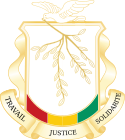1995 Guinean parliamentary election
Appearance
 |
|---|
Parliamentary elections were held in Guinea on 11 June 1995. The first multi-party elections for the National Assembly since independence, they saw 21 parties field 846 candidates for the 114 seats, divided between 38 single-member constituencies and 76 based on proportional representation, although they were boycotted by the Union of Democratic Forces.[1] The result was a victory for the Unity and Progress Party, which won 71 of the 114 seats. Voter turnout was 61.9%.[2][3]
Results
| Party | Proportional | Constituency | Total seats | |||||
|---|---|---|---|---|---|---|---|---|
| Votes | % | Seats | Votes | % | Seats | |||
| Unity and Progress Party | 990,184 | 53.55 | 41 | 30 | 71 | |||
| Rally of the Guinean People | 354,927 | 19.20 | 15 | 4 | 19 | |||
| Union for the New Republic | 178,692 | 9.66 | 7 | 2 | 9 | |||
| Union for Progress and Renewal | 170,806 | 9.24 | 7 | 2 | 9 | |||
| Union for the Progress of Guinea | 44,441 | 2.40 | 2 | 0 | 2 | |||
| Democratic Party of Guinea – African Democratic Rally | 36,709 | 1.99 | 1 | 0 | 1 | |||
| National Union for the Prosperity of Guinea | 31,295 | 1.69 | 1 | 0 | 1 | |||
| Democratic Party of Guinea | 21,233 | 1.15 | 1 | 0 | 1 | |||
| Dyama Party | 20,696 | 1.12 | 1 | 0 | 1 | |||
| Total | 1,848,983 | 100.00 | 76 | 38 | 114 | |||
| Valid votes | 1,848,983 | 97.92 | 1,840,579 | 97.57 | ||||
| Invalid/blank votes | 39,330 | 2.08 | 45,824 | 2.43 | ||||
| Total votes | 1,888,313 | 100.00 | 1,886,403 | 100.00 | ||||
| Registered voters/turnout | 3,049,262 | 61.93 | 3,049,262 | 61.86 | ||||
| Source: Nohlen et al., IPU | ||||||||
References
- ^ Guinea: Elections in 1995 Inter-Parliamentary Union
- ^ Elections in Guinea African Elections Database
- ^ Dieter Nohlen, Michael Krennerich & Bernhard Thibaut (1999) Elections in Africa: A data handbook, p455 ISBN 0-19-829645-2
